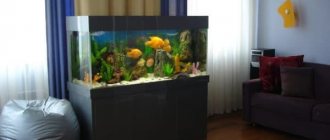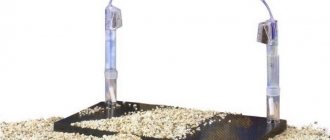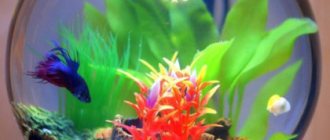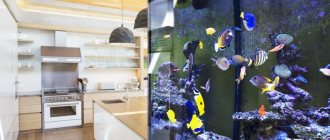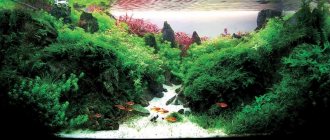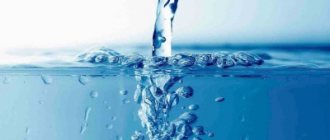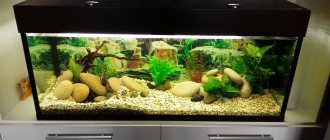4.9
(36)
Many people are skeptical about round aquariums. Rectangular, square, convex and other designs that have corners are more popular among both experienced aquarists and beginners. It is believed that a spherical container is uncomfortable for fish. However, knowing what kind of pets you can keep and how to arrange the design more profitably, you can ultimately get an excellent aquarium that will become the highlight of the entire interior.
You can place neon fish in a round aquarium.
general information
Today in stores you can find a round “jar” of any volume, ranging from 3 to 50 liters. As for the material from which they are made, there are two options. Modern aquariums are made from acrylic and silicate glass, each of which has its own characteristics.
For example, silicate glass is quite hard. It is difficult to leave a mark or scratch on it, but it breaks very easily. Standard rectangular aquariums are made from this glass. Acrylic, according to its parameters, will be much more reliable. It is characterized by plasticity and viscosity, so it is quite difficult to break such an aquarium. Despite this, it is easy to leave scratches on it, and this is its significant drawback. Round and designer aquariums of various shapes are made from acrylic.
Grebenshchikov “reinvented” “Aquarium” with the founder of reggae on the new album
Boris Borisovich loves all kinds of symbols, riddles and hoaxes. The record lasts exactly 32 minutes 32 seconds: the guru, as usual, did not explain the meaning of the numbers, but hinted that this did not happen by chance. Funds for recording the album were collected all over the world - on a crowdfunding platform, which is now very fashionable among musicians. It is posted on YouTube in one long post with video accompaniment and looks like an old computer game similar to adventure games from the 90s. A splash screen lights up on the screen and a button in English - “press start”, then figures of artists drawn in cubes appear - BG himself, his stage comrades and, of course, Lee Perry, performing in some small club. In general, Grebenshchikov seems a little tired of philosophizing and decided to have a little fun. It turned out great. The mood of the album was light, bright and incendiary.
“What do we want? No more - no less - reinvent “Aquarium” of the 80s in today’s reggae, and do it in Jamaica,” BG said on social networks. “Especially since the Great Lee “Scratch” Perry himself is in business with us. After all, Lee Perry in the middle of the 20th century invented what we now call reggae and dub. So, our idea is to paint several acoustic things from Aquarium with bright Jamaican colors. The result was a looped composition. The album begins and ends with the famous song “Babylon,” the words of which sound very relevant and new today: “There must be someone else in this city, there must be someone alive in this city.” Earlier, Boris Borisovich said that the previous work “Sign of Fire” was a desire to get out of this Babylon. Obviously, it’s not working out very well yet if we perceive this Babylon as a metaphor for the modern world and its structure, with all its monstrous distortions. In addition to this track, the disc includes such “Aquarium” compositions, already worn out by listeners to holes, as “Fish” from the album “Ichthyology”, “Apple Days” (from the concert collection “Ten Arrows”), “Ivan and Danilo”, which was recorded back in 1989 for the collection “Feudalism”, released in 2007, “Aristocrat” from the third album of the group “Taboo” from back in 1982.
Decades pass, and the lines written by BG in the last century seem to have been composed the other day. Well, for example, “which fish swims the fastest in the ocean?”, “when they go to a green light, I could give them advice,” “to walk through glass, you need to control yourself.” It’s amazing how, with a deep understanding of what is happening now, Grebenshchikov manages to remain optimistic and even support his fans with his music, although he himself does not make the most rosy forecasts about what is happening in the country and in the world.
Advantages of round aquariums
This form of container for keeping fish has few advantages. People are attracted by their unusual shape, the possibility of improving and emphasizing the interior, and creating extraordinary decor inside. In addition, a small aquarium is very easy to clean. However, such a “can” has significantly more disadvantages.
Flaws
They are associated with the special keeping of fish, which is somewhat more complex than in a regular aquarium. If certain rules and regulations are not followed, pets may feel uncomfortable and even die. Therefore, before starting such an aquarium, you need to know about all its disadvantages in order to make the right decision, weighing all the pros and cons:
- Small volume. Despite the fact that some manufacturers are ready to make a custom round aquarium with a volume of at least 100 liters, it will still be impractical and very fragile. Therefore, standard containers are 10-30 liters. However, even such a small but full-fledged aquarium must be properly equipped;
- Small sizes will not allow you to have the fish you want. You will have to choose from those species that can survive in cramped conditions (certainly not goldfish or angelfish). The same goes for plants. Size can also be the main reason for not having a heater. All this will cause temperature fluctuations, which will also cause the fish to experience severe stress;
- Number of pets. As a rule, standard volumes allow you to have a couple of inhabitants of small breeds (cockerel, thorns, neons);
- Since the flask narrows at the top, the oxygen layer will be small. This leads to a small amount of oxygen in the water, so fish that are demanding of this parameter should not be kept;
- Distortion. The convex walls of the aquarium distort the image too much, which can become uncomfortable for some types of fish;
- Although a small container is easier to clean, this is also a disadvantage. A small amount of water gets dirty faster; accordingly, the aquarium will require frequent water changes and cleaning of the walls, which will become stressful for pets.
Composition of the group "Aquarium"
Currently the following players are playing in the Aquarium group:
- Boris Grebenshchikov - vocals, guitar;
- Alexey Zubarev – guitar;
- Alexander Titov – bass guitar;
- Andrey Surotdinov – violin, percussion;
- Brian Finnegan – flute;
- Liam Bradley – drums;
- Igor Timofeev – flute, saxophone, guitar;
- Gleb Grebenshchikov - percussion.
It is worth noting that currently the composition of the Aquarium group is not stable. The musicians in the group change depending on the concert program that is presented to the audience at one time or another. Since 2015, the group rarely performs in full force, often performing as a quartet or in the format of a duet BG + Zubarev. Our list of participants names the musicians who most often perform with Boris Grebenshchikov.
How to care for a round aquarium?
Containers with a small volume must be decorated according to the principle of minimalism. It is important to correctly combine the number of decorations, plants and pets so that the latter are comfortable.
Too fine soil such as sand is not suitable for round flasks. It will muddy the waters. The best solution would be to purchase small pebbles with the addition of several large stones or shells, or fine and medium dispersed soil from a pet store.
For a round aquarium you only need live plants. Since most small flasks cannot accommodate a compressor, the plants will become the main source of oxygen. Many pets will die without this condition. Suitable species would be pistia, cryptocoryne, the well-known vallisneria and hornwort (but you need to keep an eye on it, as it can quickly fill the entire space). You can also buy elodea or nayas.
Vallisneria is an excellent source of oxygen for a round aquarium.
If the equipment is installed, you can purchase artificial plants. They are easy to care for and will retain their colorful and attractive appearance for a long time.
Equipment for the aquarium will require:
- Compressor;
- Filter;
- Backlight;
- Heater.
Many modern round aquariums are sold complete with already installed equipment necessary for the given volume. This is much more convenient than choosing everything yourself. It is also important to purchase a lid. It performs several functions at once:
- Serves as a place for mounting the backlight;
- Protects fish from jumping out and curious cats.
History of the Aquarium group
The history of the Aquarium group begins in 1972. During this time, dozens of musicians from different countries managed to play in the group, including such famous ones as Sergey Kuryokhin, Vsevolod Gakkel, Alexander Lyapin, Boris Rubekin, Djivan Gasparyan, Oleg Sakmarov, Igor Butman and many others. The official history of the group is divided into several stages, which differ from each other not only in the change in the composition of the participants, but also in the radical change in the sound.
Aquarium 1.0 (1972 – 1991)
The musical group "Aquarium" was founded by classmates Boris Grebenshchikov and Anatoly Gunitsky, better known as George. Initially, the project was positioned as a poetic and musical one. At the same time, the current name arose, the appearance of which friends interpret differently. Gunitsky claims that the name of one of the Leningrad beer bars, located on Budapestskaya Street, was taken as a basis, Grebenshchikov is inclined to the version that the name was chosen after a painful search of words for two and a half days on the Trinity Bridge over the Neva River.
At first, the group was limited to rehearsals. The composition of the team was not stable - different musicians appeared in the team, including those who later became significant Russian rock stars. One of them was the current leader of the Picnic group, Edmund Shklyarsky, who played in the Aquarium for a short time in 1973. At the same time, one of the key members of the early “golden lineup”, Mikhail “Fan” Fainshtein-Vasiliev, joined the team. A year later, keyboard player Andrei “Dyusha” Romanov joined the team, and later began playing the flute.
In 1974, the musicians recorded their first magnetic album using household appliances. The recording was called “The Temptation of the Holy Aquarium.” It was officially released only in 1997 as part of the “Prehistoric Aquarium” trilogy. This block also includes recordings from 1974, “The Parables of Count Diffuser,” and 1976, “From the Other Side of the Mirror Glass.” It is generally accepted that in 1975 the musicians recorded another work, “Minuet for the Farmer,” but this phonogram is apparently irretrievably lost.
In 1974, Anatoly Gunitsky left the team, but maintained friendly relations with its members. For some time, the Aquarium musicians try their hand at an amateur theater of the absurd on the steps of the Engineering Castle, but soon Grebenshchikov becomes disillusioned with the idea of crossing music, theater and poetry and focuses on musical activities. In 1975, cellist Vsevolod Gakkel joined the group and thus the golden lineup was formed: BG, Seva, Dyusha and Fan.
Regular concert activities of Aquarium began in 1976. One of the fateful events is a trip to the festival in Tallinn, where Grebenshchikov and Andrei Makarevich meet in the Mustamäe area on a city trolleybus. Since then, friendly relations have been established between the groups “Aquarium” and “Time Machine”. Around the same time, BG met Mikhail “Mike” Naumenko, the leader of the Zoo group, with whom Boris Borisovich recorded the album “All Brothers and Sisters” in 1978.
The apotheosis of the concert activity of Boris Grebenshchikov and the Aquarium group was their performance at the Tbilisi Rock Festival in 1980. During the concert, the musicians behaved shockingly and provocatively. As a result, the festival jury accused the group of promoting homosexuality and other perversions. As a result of this speech, Boris was expelled from the Komsomol and kicked out of work, but in his opinion, all these events actually only helped him to realize himself.
Video – Anatoly Gunitsky about the Aquarium group
Start of studio activity
In 1979, Grebenshchikov met Leningrad sound engineer Andrei Tropillo. This legendary man is famous for having recorded almost all of the first albums of the Leningrad Rock Club groups, including “Kino”, “TV”, “Alice”, “Zoo” and “Zero”. In his studio, located in the House of Young Technicians on Okhta, all significant albums of Aquarium from the early period until 1986 will be recorded.
The band's studio history began with the release of the Blue Album in 1981. Following him, the musicians recorded “Triangle”, which later became one of the cult albums of Russian rock music. In March of the same year, Aquarium joined the newly founded Leningrad rock club, which helped the group become legalized. In 1982, an expanded team recorded the album “Taboo”, and a year later - “Radio Africa”.
The group's studio recordings are rapidly spreading across the country. “Aquarium” is quickly gaining popularity, thanks to which the demand for the team is also growing. The musicians play concerts, many of which are recorded on tape and will later be released on various media as bootlegs. In 1984, the team recorded the album “Silver Day,” which many consider the pinnacle of their work.
In 1986, the album “Children of December” was released - the last numbered work made in Andrei Tropillo’s studio. In the same year, Joanna Stingray released a double vinyl collection, Red Wave, in the United States, with each side of the record entirely dedicated to the bands of the Leningrad Rock Club. In addition to “Aquarium”, the collection presents the work of “Kino”, “Alice” and the group “Strange Games”. The appearance of this publication serves as a signal for the Soviet authorities - they are releasing a compilation of the songs that made up the albums “Silver Day” and “Children of December”. This edition is known to music lovers as the “White Album”, based on the color scheme of the disc sleeve.
Andrey Tropillo about the Aquarium group
Decay of gold composition
After the release of the vinyl record, a new stage in the creative life of Boris Grebenshchikov and Aquarium begins. The group began to be invited to television to participate in various programs, including the popular “Musical Ring” program at that time. In 1987, the group recorded the soundtrack for the feature film "ASSA", which marked the beginning of collaboration with director Sergei Solovyov.
In the same year, the group recorded the album “Equinox” at the studio, and in 1988 Boris Grebenshchikov signed a contract with the Canadian record company CBS and left the USSR. The remaining members of Aquarium try themselves in solo projects, only occasionally getting together for concerts in their “native” group. However, a forced pause in joint creativity leads to escalation of conflicts and in 1991 BG announces the dissolution of the group. The last concert “Aquarium” plays at the VIII Leningrad Rock Festival.
Fragment of the last concert
Aquarium 2.0 (1992 – 1997)
From 1991 to the fall of 1992, Boris Borisovich toured as part of the BG band. Under this name, the group recorded the “Russian Album”, soon after the release of which Grebenshchikov announced the revival of “Aquarium”. In addition to BG, the new lineup includes Alexander Titov, Oleg Sakmarov, Alexey Zubarev, Alexey Ratsen and Andrey Vikharev. After some time, accordionist Sergei Shchurakov joins them. The first work of the new lineup was the album “Favorite Songs of Ramses IV,” which amazed listeners with its psychedelic sound.
In general, the version “Aquarium 2.0” continued the line of the BG band. Music critics rightly call this time the “Russian period of BG.” In 1994, the group will release the disc “Kostroma Mon Amour”, in 1995 – “Navigator”, and in 1996 – “Snow Lion”. After the release of the latter, Grebenshchikov again became interested in musical experiments, which were reflected in the “Russian-Abyssinian Orchestra” project. In 1997, Aquarium released the disc “Hyperborea,” which included previously unreleased songs from the 70s and 80s. After this, having celebrated the group’s 25th anniversary with concerts in Moscow and St. Petersburg, Grebenshchikov announced the next dissolution of the group.
Aquarium 3.0 (1999 – 2015)
Before the next rebirth of the Aquarium group, Boris Grebenshchikov managed to record the album “Lilith” (together with The Band), after which he toured for a year with the “New Electric Dog” program. During the same period, the albums “Refuge”, “Prayer and Fasting” were released, as well as remakes of old songs “BG and Deadushki”. In 1998, Grebenshchikov began working with Boris Rubekin, a keyboard player and arranger who would largely determine the sound of Aquarium in the next decade and a half.
The first album of the updated “Aquarium” was “”, released in 1999. However, fans saw the true face of the new group only in 2002, when the album “Sister Chaos” was released, the sound of which was radically different from what the group had done before. The sound has become modern, and the arrangements actively use samples and computer loops.
With the appearance of Boris Rubekin in the group, “Aquarium” found a new breath. The team has become noticeably younger and has again become interesting to the younger generation. The pinnacle of the group’s creativity in the 2000s was the release of the album “Careless Russian Tramp,” which was released in 2006. This work was highly appreciated by both music critics and colleagues. The album was praised even by Yegor Letov, the leader of the group “Civil Defense”, who was known for his skeptical attitude towards Russian rock music.
The thirst for musical experiments led to the creation of the Aquarium International project, which included musicians from around the world who played exotic instruments. In 2008, the group’s next album, “White Horse,” was released, and in 2009, a collection of previously unreleased songs, “Pushkinskaya, 10,” was released. On the eve of the band's 40th anniversary, the disc "Arkhangelsk" is released, and a year later - "A+".
On November 1, 2015, Boris Rubekin died. Later, fans of the group will recall that over the past year the usually cheerful musician has been distinguished by gloom. After his death, Boris Grebenshchikov, in the Aerostat program dedicated to Rubekin, will say that in recent months he suffered from depression, which he could not cope with. With the death of Boris, the end of the next stage in the work of Aquarium was officially announced.
Aquarium 4.0 (from 2021)
A new era of creative development at Aquarium began in 2016. The new musical face of the group has not yet been formed. However, today the group performs without a keyboard player. A new trend for the group has become free concerts on the streets of cities where large solo performances of the group are planned. Usually, a few hours before the performance, musicians set up their equipment on the street and play for passers-by.
In the spring of 2021, the mini-album “Songs of the Unloved” was released, which included only three compositions. A little earlier, in the fall of 2015, Boris Grebenshchikov collected more than 7 million rubles on the Planet crowdfunding portal to record new songs. However, only three new compositions were published during the year.

